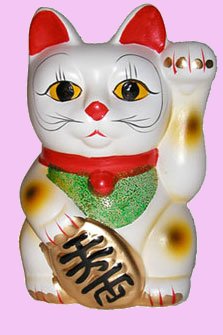
The Beckoning Cat

In china-shops throughout Japan there are on sale Maneki-Neko or Beckoning Cats, which are porcelain cats with their left paw raised in the Japanese beckoning manner; i.e. summoning a person by waving the hand palm out instead of with the palm towards him, as do foreigners. Such cats are very popular as mascots among people depending upon the public's favor for their success.
About 150 years ago there were two tea-houses near the gate of the Ekoh-in Temple, Ryogoku, Tokyo. Both houses vied with each other in attracting guests by means of large porcelain cats with paw uplifted as if beckoning to passers by. The eastern house had a golden cat, the western, a silver cat. These particular cats seem to have been well known inasmuch as mention of them is made in various old books, and also in 17-syllable poems written on the Beckoning Cat.
Yahei, the host of the eastern house, became dissolute, but his wife O-Tsuna, on the contrary, was a most amiable and charming woman, overflowing with smiles, and was popular with their guests, one of whom, named Hachirobei, an old-clothes dealer, was enamored by O-Tsuna's cheerful ways, until she cajoled him out of a large sum of money he had collected for another old-clothes dealer. Hachirobei, determining to atone with his life for his misconduct, went one evening to the Ryogoku-Bashi bridge over the Sumida intending to throw himself into the river. He was leaning against the bridge railing, ruminating over his fate, when along came O-Tsuna, his love.
"What are you doing here, Hachirobei, my dear?" she said. "No more of you, O-Tsuna!" replied Hachirobei in a fury. "You have taken all my money and you have ruined me." He then told her about his situation, and O-Tsuna, repentant, proposed that she should join her lover in his journey to the world beyond. They committed suicide in the Sumida River.
Their suicide made such a sensation in Yedo (old Tokyo) that their story was staged, and the Golden-cat Tea-house became so popular that the rival tea-house had to close.
Beckoning Cats are kept by merchants and tea-house and restaurant keepers as luck-bringers and in the belief that they attract customers-and a Beckoning Cat usually has a place in the house-alter of the demimonde.
Source: We Japanese: Being descriptions of many of the customs, manners, ceremonies, festivals, arts and crafts of the Japanese besides numerous other subjects. Fujiya Hotel. Ltd. 1950 version.
Main Index
Japan main page
Japanese-American Internment Camps index page
Japan and World War II index page
|